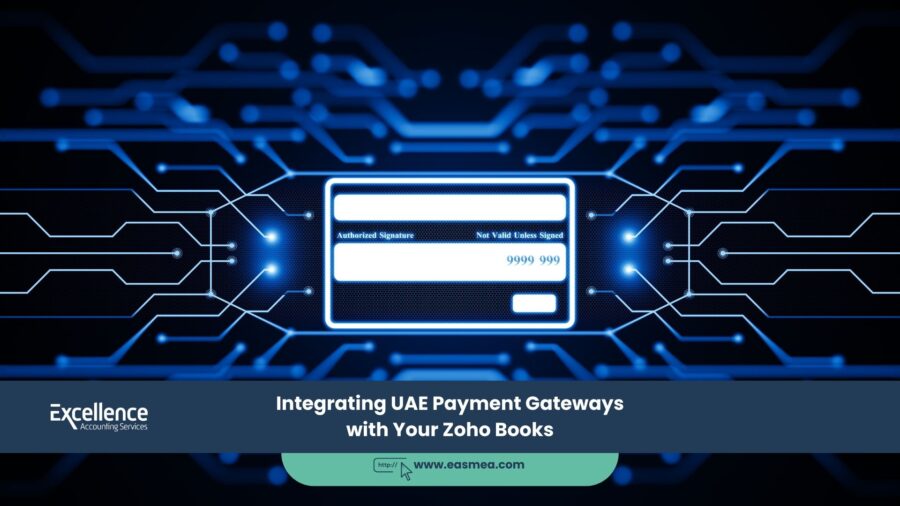A Practical Guide: Integrating UAE Payment Gateways with Your Zoho Books
In the fast-paced digital economy of the UAE, getting paid quickly and efficiently is paramount. For businesses using Zoho Books, sending an invoice is just the first step. The real goal is to make it as easy as possible for your customers to pay you. This is where integrating a local payment gateway directly into your accounting software becomes a game-changer. It transforms your invoice from a static document into an interactive payment tool, accelerating your cash flow and automating your accounting process.
- A Practical Guide: Integrating UAE Payment Gateways with Your Zoho Books
- Why Integrate a Payment Gateway? The Benefits of Automation
- How the Integration Works: A Step-by-Step Overview
- The Critical Step: Accounting for Transaction Fees
- Seamless Integration with Excellence Accounting Services (EAS)
- Frequently Asked Questions (FAQs)
- Ready to Get Paid Faster?
While Zoho Books supports several international gateways, using a UAE-based provider like **Telr** or **PayTabs** offers significant advantages for local businesses, including multicurrency processing in AED, better local support, and often, more competitive transaction fees. By connecting these gateways to your Zoho Books account, you can add a “Pay Now” button to every invoice you send, allowing clients to pay instantly with a credit or debit card.
This guide will walk you through the benefits and the practical steps of integrating UAE-specific payment gateways with your Zoho Books account. We’ll cover how the process works, how to account for the transaction fees, and why this simple integration is one of the most powerful steps you can take to improve your accounts receivable process.
Key Takeaways
- Get Paid Faster: Integrating a payment gateway adds a “Pay Now” button to your Zoho invoices, making it incredibly easy for clients to pay you instantly online.
- Automated Reconciliation: When a customer pays via the gateway, Zoho Books automatically marks the invoice as paid and records the payment, drastically reducing manual data entry and reconciliation work.
- Local is Better: Using UAE-based gateways like Telr or PayTabs offers benefits like AED processing, local support, and features tailored to the region.
- Accounting for Fees is Crucial: The payment gateway will deduct a transaction fee. This fee must be correctly recorded as a bank charge or expense in Zoho Books to ensure your accounts are accurate.
- Professional Setup is Recommended: A smooth integration requires correct setup in both your payment gateway and Zoho Books. An expert in accounting system implementation can ensure this is done right.
Why Integrate a Payment Gateway? The Benefits of Automation
Manually tracking bank transfers, reconciling payments against invoices, and chasing late payments consumes a huge amount of administrative time. Integrating a payment gateway directly addresses these pain points.
- Improved Cash Flow: The easier you make it for customers to pay, the faster they will. Instant online payments significantly reduce your Days Sales Outstanding (DSO).
- Reduced Administrative Workload: The system automates the entire process. When a payment is made, the invoice is closed, the payment is recorded, and the funds are allocated correctly. This frees up your team for more value-added tasks.
- Enhanced Customer Experience: Offering a simple, secure online payment option is a professional touch that modern customers expect.
- Better Financial Visibility: With payments and invoices updated in real-time, you always have an accurate, up-to-the-minute view of your accounts receivable and cash position.
Integrating a payment gateway turns your accounting software from a simple record-keeping tool into an active cash collection engine.
How the Integration Works: A Step-by-Step Overview
The process is straightforward. Zoho Books has built-in integrations with a number of popular gateways, including UAE-based providers.
- Set Up Your Gateway Account: First, you need an active merchant account with a supported UAE gateway like Telr or PayTabs.
- Configure the Integration in Zoho Books:
- Go to Settings > Integrations > Online Payments.
- Find your chosen gateway (e.g., Telr) and click “Set up Now”.
- You will be prompted to enter your merchant credentials (like your Store ID and Authentication Key) which you get from the payment gateway.
- You will map the payments to a specific bank account in your Zoho Books Chart of Accounts.
- Enable Payments on Invoices: When you create a new invoice, you will see an option to accept payments through the integrated gateways. Ensure this is selected.
- Customer Pays: Your customer receives the invoice via email, clicks the “Pay Now” button, and is taken to a secure page hosted by the payment gateway to enter their card details.
- Automatic Reconciliation: Once the payment is successful, Zoho Books is automatically notified. It marks the invoice as “Paid,” creates a payment receipt, and records the funds in the bank account you designated.
The Critical Step: Accounting for Transaction Fees
This is the part that is most often handled incorrectly. The payment gateway does not deposit the full invoice amount into your bank account; they first deduct their fee. For example, on an AED 1,000 payment, they might deduct a 2.5% fee (AED 25) and deposit only AED 975.
Zoho Books automates this. When setting up the integration, it creates a default “Gateway Fees” or “Bank Charges” expense account. When the payment is recorded, Zoho Books will automatically:
- Record the full AED 1,000 payment against the invoice.
- Record the AED 975 deposit into your bank account.
- Record the AED 25 difference as an expense in the “Gateway Fees” account.
This ensures that your revenue is recorded correctly, your invoice is fully closed, and your bank account reconciles perfectly. This level of automation is a key part of good accounting and bookkeeping.
Seamless Integration with Excellence Accounting Services (EAS)
While the integration process is designed to be user-friendly, ensuring it’s set up for perfect reconciliation requires expertise. EAS provides specialized services to help you get the most out of your Zoho Books and payment gateway integration.
- Zoho Books and Payment Gateway Setup: We manage the end-to-end setup process, from configuring your gateway account to correctly integrating it with Zoho Books and ensuring the fee accounts are mapped correctly.
- Process Optimization: We help you streamline your entire accounts receivable process, from invoicing to automated payment reminders and reconciliation.
- Outsourced CFO Services: Our CFO services can help you analyze payment data to understand customer behavior, manage cash flow more effectively, and negotiate better rates with gateway providers.
- Comprehensive Staff Training: We train your team on the new, automated workflow to ensure they can manage the system efficiently.
Frequently Asked Questions (FAQs)
Zoho Books has direct integrations with several UAE-focused gateways, most notably **Telr** and **PayTabs**. They also support international gateways like Stripe, which has a strong presence in the UAE.
Fees vary, but they typically consist of a percentage of the transaction value (e.g., 2.5% – 3.5%) plus a small fixed fee per transaction (e.g., AED 1-2). Rates can often be negotiated based on your transaction volume.
A payment gateway is the technology that securely captures and transmits the customer’s payment information. A payment processor is the financial institution that communicates with the banks to execute the transaction. For a business owner, providers like Telr and PayTabs typically offer an all-in-one solution that includes both.
This is known as the settlement period. It varies by gateway but is typically between 2 to 7 business days. The gateway will usually deposit the funds into your account in a batch.
Yes. Most UAE gateways support multicurrency processing. You can invoice a client in USD, and they can pay in USD. The gateway will handle the currency conversion and deposit the equivalent amount in AED into your account. Zoho Books’ multi-currency features handle this seamlessly.
Absolutely. The entire payment process happens on a secure page hosted by the payment gateway, which is PCI DSS compliant (the global standard for payment card security). Your Zoho Books system never sees or stores the customer’s credit card details.
The payment gateway provides a merchant dashboard where you can see the status of all transactions, including declines. Chargebacks (disputes) are also managed through the gateway’s portal. You would then need to make a manual journal entry in Zoho Books to reverse the payment and reopen the invoice.
Yes. Both Zoho Books and the payment gateways support recurring billing. You can set up a recurring invoice profile in Zoho, and the system will automatically charge the customer’s card on file via the gateway at the specified interval.
You will need a corporate bank account in the UAE. The payment gateway will link to this account to deposit your settlements.
It’s more manual. You would have to download transaction reports from your gateway and then either manually record each payment in Zoho Books or use the bank reconciliation screen to match the batch deposits to the open invoices. A direct integration is far more efficient.
Conclusion: A Simple Step for a Smarter Business
In today’s competitive landscape, businesses that thrive are those that leverage technology to become more efficient. Integrating your UAE payment gateway with Zoho Books is a perfect example of this. It’s a relatively simple step that delivers a powerful return: faster payments, less administration, happier customers, and a crystal-clear, real-time view of your financial health. It is a foundational move for any modern, growth-oriented business in the UAE.
Ready to Get Paid Faster?
Contact Excellence Accounting Services for expert assistance in setting up and optimizing your online payment systems.




